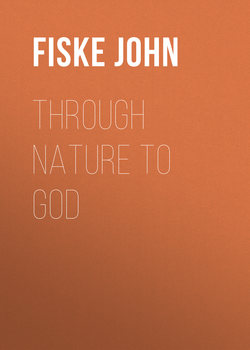Читать книгу Through Nature to God - Fiske John - Страница 4
THE MYSTERY OF EVIL
I
The Serpent's Promise to the Woman
Оглавление"Your eyes shall be opened, and ye shall be as gods, knowing good and evil." Genesis iii. 5.
The legend in which the serpent is represented as giving this counsel to the mother of mankind occurs at the beginning of the Pentateuch in the form which that collection of writings assumed after the return of the Jews from the captivity at Babylon, and there is good reason for believing that it was first placed there at that time. Allusions to Eden in the Old Testament literature are extremely scarce,1 and the story of Eve's temptation first assumes prominence in the writings of St. Paul. The marks of Zoroastrian thought in it have often been pointed out. This garden of Eden is a true Persian paradise, situated somewhere in that remote wonderland of Aryana Vaëjo to which all Iranian tradition is so fond of pointing back. The wily serpent is a genuine Parsee serpent, and the spirit which animates him is that of the malicious and tricksome Ahriman, who takes delight in going about after the good creator Ormuzd and spoiling his handiwork. He is not yet identified with the terrible Satan, the accusing angel who finds out men's evil thoughts and deeds. He is simply a mischief-maker, and the punishment meted out to him for his mischief reminds one of many a curious passage in the beast epos of primitive peoples. As in the stories which tell why the mole is blind or why the fox has a bushy tail, the serpent's conduct is made to account for some of his peculiar attributes. As a punishment he is made to crawl upon his belly, and be forever an object of especial dread and loathing to all the children of Eve.
What, then, is the crime for which the serpent Ahriman thus makes bitter expiation? In what way has he spoiled Ormuzd's last and most wonderful creation? He has introduced the sense of sin: the man and the woman are afraid, and hide themselves from their Lord whom they have offended. Yet he has been not altogether a deceiving serpent. In one respect he had spoken profound truth. The man and the woman have become as gods. In the Hebrew story Jehovah says, "Behold the man is become as one of us;" that is to say, one of the Elohim or heavenly host, who know the good and the evil. Man has apparently become a creature against whom precautions need to be taken. It is hinted that by eating of the other tree and acquiring immortal life he would achieve some result not in accordance with Jehovah's will, yet which it would then be too late to prevent. Accordingly, any such proceedings are forestalled by driving the man and woman from the garden, and placing sentinels there with a fiery sword which turns hither and thither to warn off all who would tread the path that leads to the tree of life. The anthropomorphism of the story is as vivid as in those Homeric scenes in which gods and men contend with one another in battle. It is plainly indicated that Jehovah's wrath is kindled at man's presumption in meddling with what belongs only to the Elohim; man is punished for his arrogance in the same spirit as when, later on, he gives his daughters in marriage to the sons of the Elohim and brings on a deluge, or when he strives to build a tower that will reach to heaven and is visited with a confusion of tongues. So here in Eden he has come to know too much, and Ahriman's heinous crime has consisted in helping him to this interdicted knowledge.
The serpent's promise to the woman was worthy of the wisest and most astute of animals. But with yet greater subtlety he might have declared, Except ye acquire the knowledge of good and evil, ye cannot come to be as gods; divine life can never be yours. Throughout the Christian world this legend of the lost paradise has figured as the story of the Fall of Man; and naturally, because of the theological use of it made by St. Paul, who first lifted the story into prominence in illustrating his theory of Christ as the second Adam: since by man came death into the world, by man came also the resurrection from death and from sin. That there is truth of the most vital sort in the Pauline theory is undeniable; but there are many things that will bear looking at from opposite points of view, for aspects of truth are often to be found on both sides of the shield, and there is a sense in which we may regard the loss of paradise as in itself the beginning of the Rise of Man. For this, indeed, we have already found some justification in the legend itself. It is in no spirit of paradox that I make this suggestion. The more patiently one scrutinizes the processes whereby things have come to be what they are, the more deeply is one impressed with its profound significance.
1
Isaiah li. 3; Joel ii. 3; Ezekiel xxviii. 13, xxxi. 8, 9.
